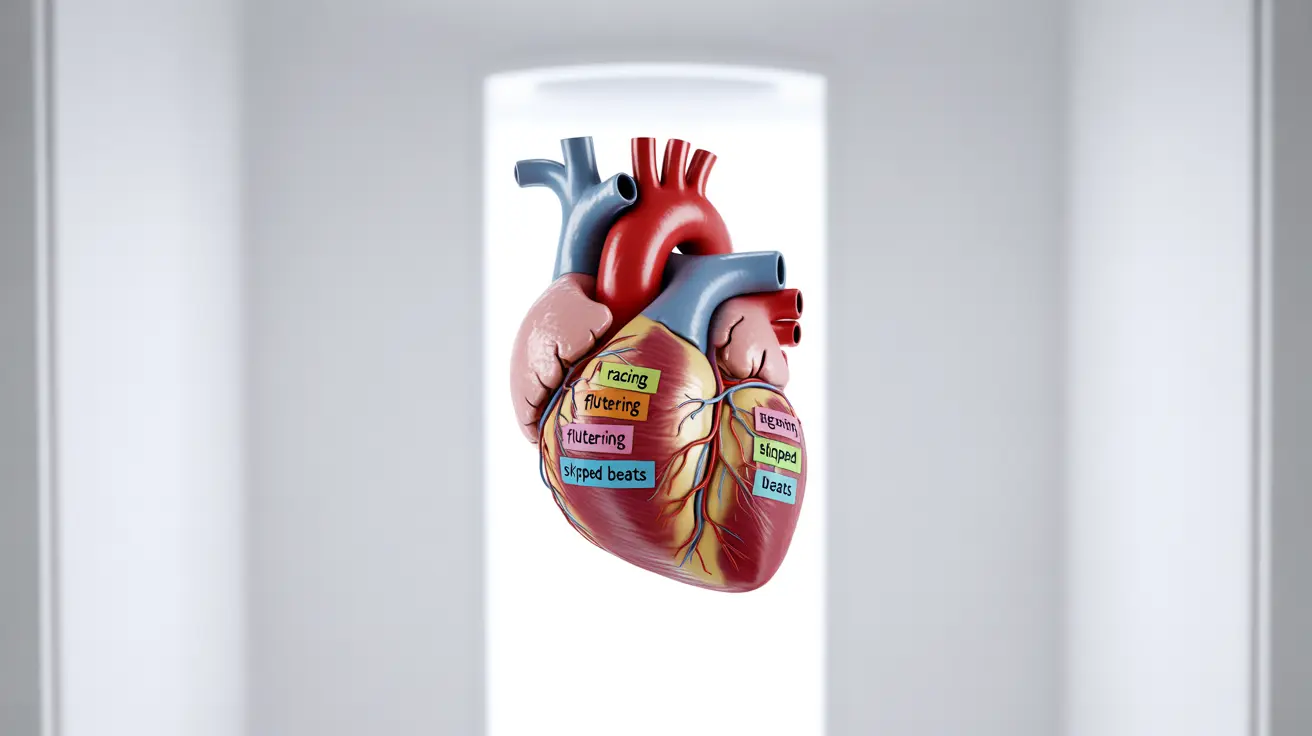Heart palpitations can be an unsettling experience, causing you to suddenly become aware of your heartbeat in ways that feel unusual or concerning. These sensations might include feeling like your heart is racing, fluttering, skipping beats, or pounding harder than usual. While often harmless, understanding the causes and knowing when to seek medical attention is crucial for your health and peace of mind.
In this comprehensive guide, we'll explore the various causes of heart palpitations, discuss when they might signal a more serious condition, and provide practical advice on prevention and management strategies.
Common Causes of Heart Palpitations
Heart palpitations can occur due to various triggers, ranging from everyday lifestyle factors to medical conditions:
Lifestyle and Environmental Factors
- Caffeine consumption
- Stress and anxiety
- Strenuous exercise
- Dehydration
- Lack of sleep
- Certain medications
- Alcohol or nicotine use
Medical Conditions
- Thyroid disorders
- Anemia
- Heart rhythm abnormalities
- Hormonal changes
- Low blood sugar
- Electrolyte imbalances
Recognizing Different Types of Palpitations
Heart palpitations can manifest in several ways, each potentially indicating different underlying causes:
Racing Heart
A rapid heartbeat that feels like your heart is running a marathon might be triggered by anxiety, exercise, or stimulants.
Skipped Beats
The sensation of your heart "skipping" or adding extra beats could be caused by premature contractions, which are usually harmless but should be evaluated if frequent.
Fluttering Sensations
A fluttering feeling in your chest might indicate atrial fibrillation or other rhythm disturbances that require medical attention.
When to Seek Medical Attention
While many heart palpitations are benign, certain symptoms warrant immediate medical evaluation:
- Chest pain or discomfort
- Shortness of breath
- Dizziness or fainting
- Severe anxiety
- Unusual sweating
- Palpitations that occur frequently or last long periods
Prevention and Management Strategies
Several lifestyle modifications can help reduce the frequency of heart palpitations:
Stress Management
- Practice regular relaxation techniques
- Try deep breathing exercises
- Consider meditation or yoga
- Maintain regular exercise routines
Dietary Modifications
- Reduce caffeine intake
- Avoid alcohol
- Stay well-hydrated
- Maintain balanced meals
- Avoid triggering foods
Frequently Asked Questions
What are the common causes of heart palpitations and how can I identify them?
Heart palpitations commonly result from stress, caffeine, exercise, or underlying medical conditions. You can identify them by keeping a symptom diary noting when they occur, what you were doing, and what you consumed beforehand. This information can help identify patterns and triggers.
When should I see a doctor about heart palpitations and what symptoms indicate an emergency?
Seek immediate medical attention if palpitations are accompanied by chest pain, difficulty breathing, dizziness, or fainting. Regular palpitations that interfere with daily activities or cause anxiety should be evaluated by a healthcare provider.
How do doctors diagnose heart palpitations and what tests might I need?
Doctors typically start with a physical examination and medical history. They may order tests including an ECG, Holter monitor, blood tests, and possibly an echocardiogram to evaluate heart structure and function.
Can lifestyle changes, like reducing caffeine or managing stress, help prevent heart palpitations?
Yes, lifestyle modifications often effectively reduce palpitations. Key changes include limiting caffeine and alcohol, managing stress through relaxation techniques, maintaining regular exercise, and ensuring adequate sleep and hydration.
How can I tell the difference between heart palpitations caused by anxiety and those caused by a heart condition?
Anxiety-related palpitations often occur during stressful situations and may be accompanied by other anxiety symptoms like sweating or trembling. Heart condition-related palpitations might occur randomly, during physical activity, or with other cardiac symptoms. However, only a medical professional can definitively determine the cause.




